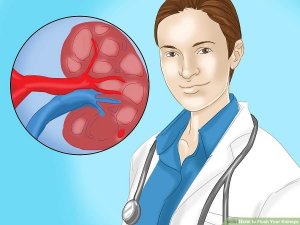Read These 7 Signs of Kidney Problems


Written and verified by the doctor Grecia Morillo
There are some signs of kidney problems that alert us to the fact that something is not functioning correctly in our body. When in doubt, the best thing to do is to get informed to be able to detect the origin of the problem on time and consult a doctor.
Remember that the kidney’s job is to filter all of the waste in the body. Once all of this is filtered out, it’s converted to urine and leaves the body. This is mainly composed of toxins and water.
One of the most common kidney problems occurs when the kidneys fail to filter the blood because of insufficient fluids, particularly water. When not drinking enough water, body wastes and toxins are retained in the body. Then, urea and creatinine accumulate in the body and lead to a state of decomposition.
Can kidney failure be detected at the onset?

In some cases, there are various signs that alert you to problems at the beginning. You should pay attention to each one of these. It’s advisable to avoid allowing the condition to become advanced and reach a stage that can become fatal.
Above all, take note if you have one of he following illnesses:
• Diabetes
• Kidney stones
• High blood pressure
• Congestive heart failure
Nevertheless, it’s very common to have difficulty getting an immediate diagnosis of renal failure. This is because, for many scientists, it is one of the silent illnesses.
We recommend: 4 Tips to Avoid Kidney Disease
Signs that may alert us to kidney problems
Changes in urination patterns
One of the very important signs of renal disease is changes that are seen in the urine. This is not specifically the physical characteristics, but more in the quantity of times one urinates and in the amount of urine.
When kidney problems exist, the quantity of urine tends to increase in the first stages. Later, it tends to diminish. This occurs in spite of the increase in the sensation of needing to urinate.
Fluid retention
Fluid retention is one of the unmistakable signs of kidney problems. The proof of this is in swollen legs that occur without having done any physical exercise.
In more advanced cases, there is also soft swelling in the ankles, the hands and even the face. This results in resorting to remedies to combat the retention of fluids, even if only temporarily.
Also of interest: 6 Natural ways to prevent kidney disease
Pay attention to each of the signs of kidney problems
Extreme fatigue
Permanent fatigue and feeling tired are a sign that something isn’t going well in the body. This could be a sign of renal problems.
Fluid retention, as well as the lack of filtration of toxins and wastes, provoke fatigue in people who have kidney issues.
Above all, it’s important to consult a doctor to study the medical causes of chronic fatigue in your case. This way, you will know for certain if you have kidney failure or if there is another cause.

Anemia is another clear sign of possible kidney problems. However, anemia does not necessarily mean a kidney condition exists. Studies with a specialist will inform you whether or not the anemia is due to a renal problem.
General itching
General itching, or itchy skin, is one of the sure signs of renal problems. This itchy skin can be caused by poor functioning of the kidneys. The toxins build up and compromise health. If you have itching, pay attention and visit a doctor.
All cited sources were thoroughly reviewed by our team to ensure their quality, reliability, currency, and validity. The bibliography of this article was considered reliable and of academic or scientific accuracy.
- Clinical Practice guidelines: Nutrition in Chronic Renal Failure. Initiative, National Kidney Foundation Dialysis Outcomes Quality. Am J Kid Disease. 2011;37(Suppl.2):66-70. https://pubmed.ncbi.nlm.nih.gov/11158865/
- Cueto-manzano, A. M., Cort, L., Mart, R., Rojas-campos, E. & Benjamin, G. Prevalence of Chronic Kidney Disease in an Adult Population. Arch Med Res. 2014;45(6):507-13. https://pubmed.ncbi.nlm.nih.gov/24992221/
- Instituto Nacional de la Diabetes y las Enfermedades Digestivas y Renales. Pruebas y diagnóstico de la enfermedad de los riñones. (Abril 2017) https://www.niddk.nih.gov/health-information/informacion-de-la-salud/enfermedades-rinones/informacion-general/diagnostico
- Toblli, JE, García-García, Á., Aristizábal, A., Quintero, E., Arango, J., Buitrago, C., Gómez, R., Leguizamón, H., Martínez, J., Nieto, I. , Osorio, M., Pertuz, A., Restrepo, C., Robayo, A., Rodríguez, K., Rodríguez, R., Romero, JD, Roselli, C., Torres, R.,… Amair, P. (2009). Diagnóstico y tratamiento de la anemia en pacientes con enfermedad renal crónica en todos sus estadios. Grupo de Trabajo Consenso del Anemia América Latina (AWGLA). Diálisis y Trasplante, 30 (3), 104–108. https://doi.org/10.1016/s1886-2845(09)71938-1
This text is provided for informational purposes only and does not replace consultation with a professional. If in doubt, consult your specialist.








